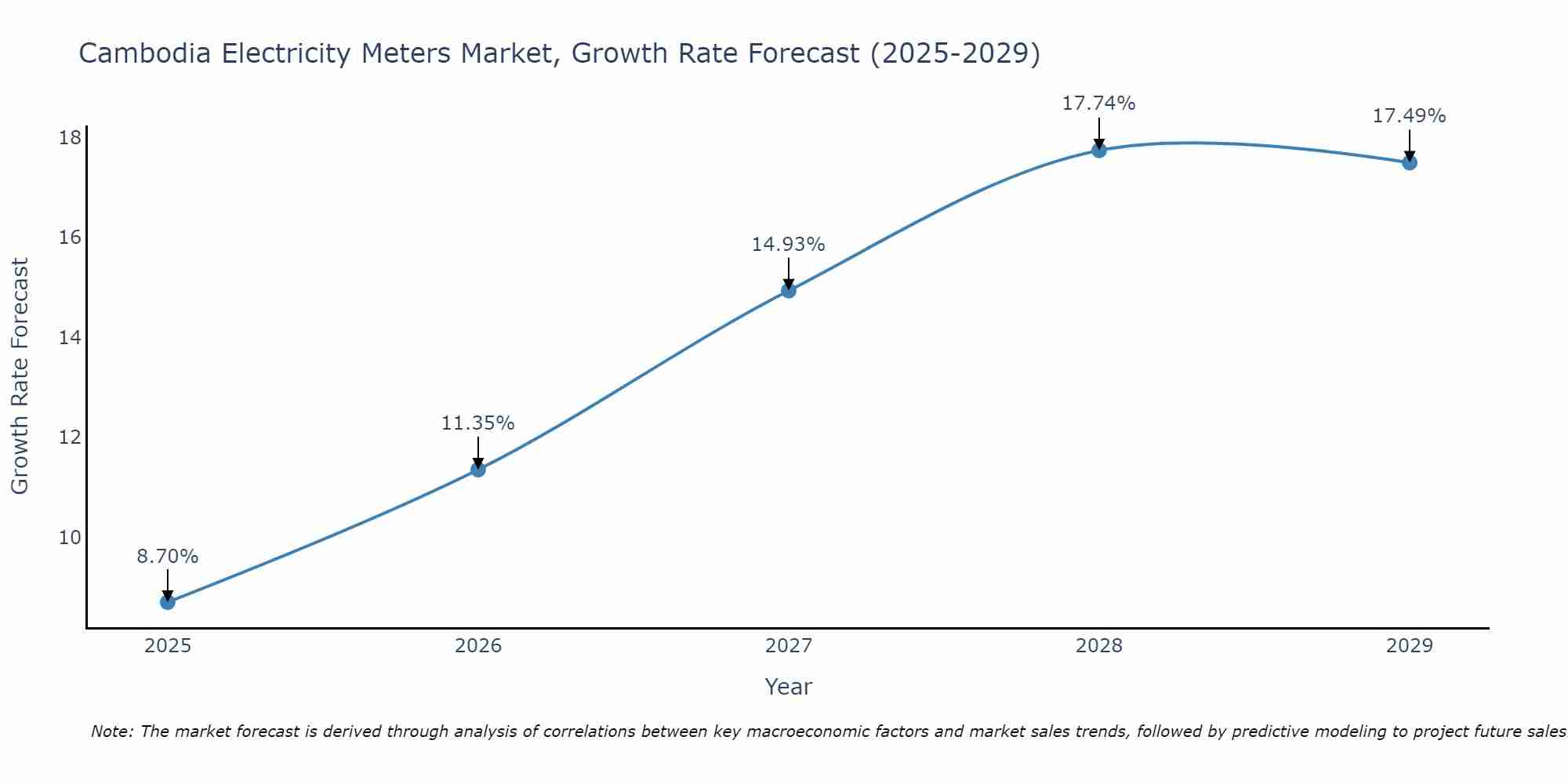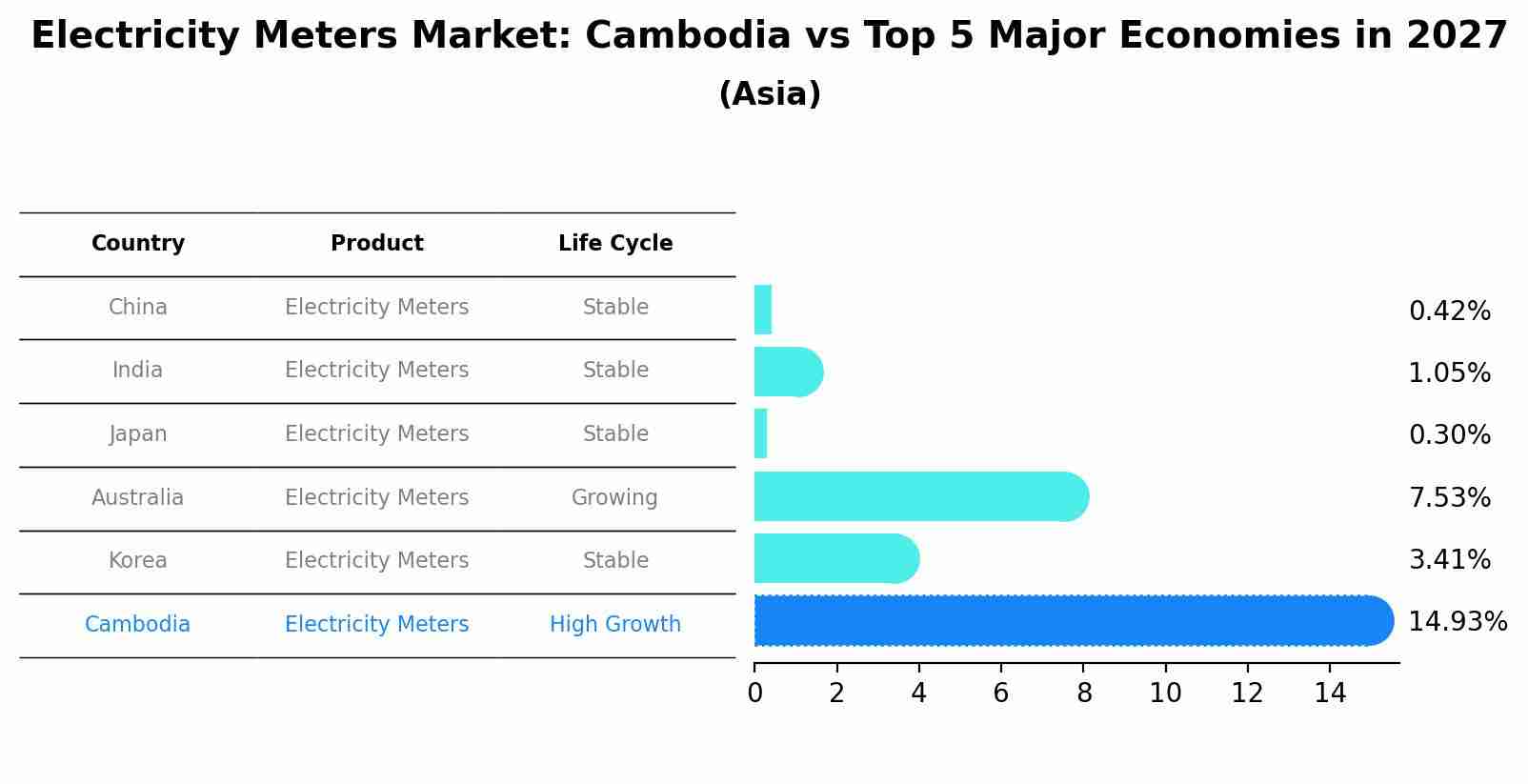Cambodia Electricity Meters Market (2025-2031) Outlook | Revenue, Growth, Industry, Forecast, Trends, Share, Analysis, Companies, Value & Size
| Product Code: ETC432929 | Publication Date: Oct 2022 | Updated Date: Jul 2025 | Product Type: Market Research Report | |
| Publisher: 6Wresearch | Author: Bhawna Singh | No. of Pages: 75 | No. of Figures: 35 | No. of Tables: 20 |
Cambodia Electricity Meters Market Size Growth Rate
The Cambodia Electricity Meters Market is projected to witness mixed growth rate patterns during 2025 to 2029. Growth accelerates to 17.74% in 2028, following an initial rate of 8.70%, before easing to 17.49% at the end of the period.

Electricity Meters Market: Cambodia vs Top 5 Major Economies in 2027 (Asia)
By 2027, the Electricity Meters market in Cambodia is anticipated to reach a growth rate of 14.93%, as part of an increasingly competitive Asia region, where China remains at the forefront, supported by India, Japan, Australia and South Korea, driving innovations and market adoption across sectors.

Cambodia Electricity Meters Market Synopsis
The Cambodia Electricity Meters Market is experiencing steady growth driven by increasing urbanization, industrialization, and government initiatives to improve access to electricity. The market is dominated by traditional electromechanical meters, but there is a growing interest in smart meters due to their ability to enhance efficiency and enable better energy management. Key players in the market include Landis+Gyr, Itron Inc., and Holley Technology Ltd. The market is characterized by increasing investments in infrastructure development and renewable energy projects, driving the demand for advanced metering solutions. Factors such as rising electricity consumption, regulatory requirements for metering, and the need for accurate billing are also contributing to the market growth. Overall, the Cambodia Electricity Meters Market presents opportunities for both domestic and international metering companies to expand their presence in the country.
Cambodia Electricity Meters Market Trends
The Cambodia Electricity Meters Market is currently experiencing a shift towards smart meters, driven by the government`s initiatives to modernize the country`s energy infrastructure. Smart meters are gaining popularity due to their ability to provide real-time data on energy consumption, improve billing accuracy, and enable better management of electricity distribution. This trend is also fueled by the increasing demand for energy efficiency and the growing adoption of renewable energy sources in Cambodia. Additionally, there is a rising focus on digitalization and automation in the electricity sector, leading to an increased interest in advanced metering solutions among utilities and consumers alike. Overall, the Cambodia Electricity Meters Market is witnessing a transition towards smart technologies that offer enhanced functionality and efficiency in energy management.
Cambodia Electricity Meters Market Challenges
In the Cambodia Electricity Meters Market, a major challenge is the prevalence of outdated infrastructure and technology, leading to inaccuracies in meter readings and billing. Additionally, the high initial costs associated with upgrading meters to more advanced, automated systems pose a barrier to adoption among both consumers and utilities. Poor meter tampering detection and theft prevention mechanisms further compound the challenges faced by utility providers in accurately measuring and billing electricity usage. Regulatory issues and lack of standardization also create obstacles for market players looking to introduce innovative metering solutions. Overall, addressing these challenges will require significant investment in modernizing infrastructure, improving regulatory frameworks, and increasing awareness about the benefits of advanced metering technologies in Cambodia.
Cambodia Electricity Meters Market Investment Opportunities
The Cambodia Electricity Meters Market presents promising investment opportunities due to the country`s growing energy sector and increasing demand for reliable electricity. As Cambodia continues to modernize its infrastructure and enhance access to electricity in both urban and rural areas, the demand for electricity meters is expected to rise significantly. Investing in the manufacturing, distribution, or installation of smart meters, prepaid meters, or other advanced metering technologies could be lucrative. Additionally, investing in renewable energy projects, such as solar power, and integrating smart metering solutions could further drive growth in the market. Collaborating with local utilities and government agencies to support initiatives aimed at improving energy efficiency and monitoring electricity consumption could also be a strategic investment approach in the Cambodia Electricity Meters Market.
Jordan Agar Market Government Policies
The government of Cambodia has implemented policies to promote the use of electricity meters in the country. The Electricity Authority of Cambodia (EAC) has set regulations requiring all electricity consumers to have meters installed to accurately measure and monitor their energy usage. This initiative aims to promote energy efficiency, reduce electricity theft, and ensure fair billing practices. Additionally, the government has introduced incentives for utilities and consumers to adopt advanced metering technologies, such as smart meters, to enhance monitoring and control of energy consumption. These policies are part of the government`s broader efforts to modernize the electricity sector, improve access to reliable electricity supply, and promote sustainable energy practices in Cambodia.
Cambodia Electricity Meters Market Future Outlook
The Cambodia Electricity Meters Market is anticipated to witness steady growth in the coming years due to the increasing demand for electricity in both urban and rural areas. The government`s efforts to improve electrification rates and infrastructure development projects are expected to drive the market growth. Additionally, the growing awareness about energy conservation and the adoption of smart meter technology are likely to further boost market expansion. However, challenges such as regulatory complexities, limited access to funding for metering projects, and the need for skilled labor may hinder the market growth to some extent. Overall, the Cambodia Electricity Meters Market is poised for growth opportunities, especially with the increasing focus on efficient energy management and the deployment of advanced metering solutions.
Key Highlights of the Report:
- Cambodia Electricity Meters Market Outlook
- Market Size of Cambodia Electricity Meters Market, 2024
- Forecast of Cambodia Electricity Meters Market, 2031
- Historical Data and Forecast of Cambodia Electricity Meters Revenues & Volume for the Period 2021 - 2031
- Cambodia Electricity Meters Market Trend Evolution
- Cambodia Electricity Meters Market Drivers and Challenges
- Cambodia Electricity Meters Price Trends
- Cambodia Electricity Meters Porter's Five Forces
- Cambodia Electricity Meters Industry Life Cycle
- Historical Data and Forecast of Cambodia Electricity Meters Market Revenues & Volume By Type for the Period 2021 - 2031
- Historical Data and Forecast of Cambodia Electricity Meters Market Revenues & Volume By Single Phase for the Period 2021 - 2031
- Historical Data and Forecast of Cambodia Electricity Meters Market Revenues & Volume By Three Phase for the Period 2021 - 2031
- Historical Data and Forecast of Cambodia Electricity Meters Market Revenues & Volume By Analog for the Period 2021 - 2031
- Historical Data and Forecast of Cambodia Electricity Meters Market Revenues & Volume By Smart for the Period 2021 - 2031
- Historical Data and Forecast of Cambodia Electricity Meters Market Revenues & Volume By Application for the Period 2021 - 2031
- Historical Data and Forecast of Cambodia Electricity Meters Market Revenues & Volume By Residential for the Period 2021 - 2031
- Historical Data and Forecast of Cambodia Electricity Meters Market Revenues & Volume By Commercial for the Period 2021 - 2031
- Historical Data and Forecast of Cambodia Electricity Meters Market Revenues & Volume By Industrial for the Period 2021 - 2031
- Historical Data and Forecast of Cambodia Electricity Meters Market Revenues & Volume By Others for the Period 2021 - 2031
- Cambodia Electricity Meters Import Export Trade Statistics
- Market Opportunity Assessment By Type
- Market Opportunity Assessment By Application
- Cambodia Electricity Meters Top Companies Market Share
- Cambodia Electricity Meters Competitive Benchmarking By Technical and Operational Parameters
- Cambodia Electricity Meters Company Profiles
- Cambodia Electricity Meters Key Strategic Recommendations
Frequently Asked Questions About the Market Study (FAQs):
- Single User License$ 1,995
- Department License$ 2,400
- Site License$ 3,120
- Global License$ 3,795
Search
Related Reports
- Vietnam System Integrator Market (2025-2031) | Size, Companies, Analysis, Industry, Value, Forecast, Growth, Trends, Revenue & Share
- ASEAN and Thailand Brain Health Supplements Market (2025-2031) | Strategy, Consumer Insights, Analysis, Investment Trends, Opportunities, Growth, Size, Share, Industry, Revenue, Segments, Value, Segmentation, Supply, Forecast, Restraints, Outlook, Competition, Drivers, Trends, Demand, Pricing Analysis, Competitive, Strategic Insights, Companies, Challenges
- ASEAN Bearings Market (2025-2031) | Strategy, Consumer Insights, Analysis, Investment Trends, Opportunities, Growth, Size, Share, Industry, Revenue, Segments, Value, Segmentation, Supply, Forecast, Restraints, Outlook, Competition, Drivers, Trends, Demand, Pricing Analysis, Competitive, Strategic Insights, Companies, Challenges
- Europe Flooring Market (2025-2031) | Outlook, Share, Industry, Trends, Forecast, Companies, Revenue, Size, Analysis, Growth & Value
- Saudi Arabia Manlift Market (2025-2031) | Outlook, Size, Growth, Trends, Companies, Industry, Revenue, Value, Share, Forecast & Analysis
- Uganda Excavator, Crane, and Wheel Loaders Market (2025-2031) | Strategy, Consumer Insights, Analysis, Investment Trends, Opportunities, Growth, Size, Share, Industry, Revenue, Segments, Value, Segmentation, Supply, Forecast, Restraints, Outlook, Competition, Drivers, Trends, Demand, Pricing Analysis, Competitive, Strategic Insights, Companies, Challenges
- Rwanda Excavator, Crane, and Wheel Loaders Market (2025-2031) | Strategy, Consumer Insights, Analysis, Investment Trends, Opportunities, Growth, Size, Share, Industry, Revenue, Segments, Value, Segmentation, Supply, Forecast, Restraints, Outlook, Competition, Drivers, Trends, Demand, Pricing Analysis, Competitive, Strategic Insights, Companies, Challenges
- Kenya Excavator, Crane, and Wheel Loaders Market (2025-2031) | Strategy, Consumer Insights, Analysis, Investment Trends, Opportunities, Growth, Size, Share, Industry, Revenue, Segments, Value, Segmentation, Supply, Forecast, Restraints, Outlook, Competition, Drivers, Trends, Demand, Pricing Analysis, Competitive, Strategic Insights, Companies, Challenges
- Angola Excavator, Crane, and Wheel Loaders Market (2025-2031) | Strategy, Consumer Insights, Analysis, Investment Trends, Opportunities, Growth, Size, Share, Industry, Revenue, Segments, Value, Segmentation, Supply, Forecast, Restraints, Outlook, Competition, Drivers, Trends, Demand, Pricing Analysis, Competitive, Strategic Insights, Companies, Challenges
- Israel Intelligent Transport System Market (2025-2031) | Strategy, Consumer Insights, Analysis, Investment Trends, Opportunities, Growth, Size, Share, Industry, Revenue, Segments, Value, Segmentation, Supply, Forecast, Restraints, Outlook, Competition, Drivers, Trends, Demand, Pricing Analysis, Competitive, Strategic Insights, Companies, Challenges
Industry Events and Analyst Meet
Our Clients
Whitepaper
- Middle East & Africa Commercial Security Market Click here to view more.
- Middle East & Africa Fire Safety Systems & Equipment Market Click here to view more.
- GCC Drone Market Click here to view more.
- Middle East Lighting Fixture Market Click here to view more.
- GCC Physical & Perimeter Security Market Click here to view more.
6WResearch In News
- Doha a strategic location for EV manufacturing hub: IPA Qatar
- Demand for luxury TVs surging in the GCC, says Samsung
- Empowering Growth: The Thriving Journey of Bangladesh’s Cable Industry
- Demand for luxury TVs surging in the GCC, says Samsung
- Video call with a traditional healer? Once unthinkable, it’s now common in South Africa
- Intelligent Buildings To Smooth GCC’s Path To Net Zero













